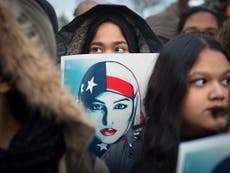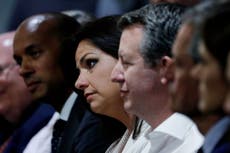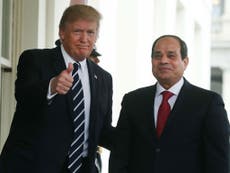Trump's threat to the Muslim Brotherhood may be a gift for Egypt's president – but it should be far more
The group wants to insert its twisted religious thinking into the mechanics of society; if designation as a terrorist group puts obstacles in its path then it should be welcomed

The Muslim Brotherhood has become part of the Muslim political spectrum all over the world and its ideology has been combined with Islamic thinking for nearly a century. Now, Donald Trump is planning to designate it as a terrorist group. It is hard to argue with the logic, but it may be too little, too late.
The Islamic Revolutionary Guard Corps (IRGC) of Iran was given the same designation last month, the first foreign military force to receive it. Both the IRGC and the Muslim Brotherhood (MB) are pillars of the Islamic movement in the Middle East and now face travel and economic sanctions. By designating them, Trump is trying to change political Islam’s historical order in the region.
Both believe in exporting their toxic ideologies beyond Iran and Egypt’s borders, and both work hard to serve an ultimate goal of integrating conservative Islamic thinking deep into the workings of society.
Both groups, although they belong to different branches of Islam, (IRGC is Shia, MB is Sunni), have links to terrorism. The UK has stopped short of labelling MB a terrorist group, but former prime minister David Cameron has described parts of MB as having “a highly ambiguous relationship with violent extremism”.
Their strategy is simple: encourage some form of chaos in troubled countries and seek power in the mess that follows. Being a sectarian minority, power abroad for Iran means using the IRGC to create a stronger-than-the-state militia capable politically and militarily of imposing its agenda on the wobbly local government such as Hezbollah in Lebanon and the Houthis in Yemen. But the MB thinks differently.
This group is the most sophisticated the Arab world has ever produced. Since its foundation in 1928, it has built a cluster-like trans-border structure using ideology and a complicated self-designed welfare system to survive and expand.
In the Arab world, the MB has created what they call the “virtuous society”, which is strictly conservative and supports any Islamic “resistance” of the status quo, even if it comes from al-Qaeda-like groups such as Ansar al-Sharia in Libya and Jaish al-Islam and other factions in Syria.
Equally, the MB can be so pragmatic that it builds alliances with this same status quo, whether it is gulf monarchies or dictatorships in military-ruled countries, like Egypt. They sweep swiftly and smoothly between the far right and far left in order to get what they want – a place for hardline Islamic philosophy in the heart of politics.
Trump’s decision is not yet straightforward. If the group is to be designated as a terror organisation only in Egypt, it will look as if Trump is doing a simple favour to his friend, president Abdel Fattah al-Sisi. But the Muslim Brotherhood is no longer just a local issue for Egypt. It has become a loose-knit network, with affiliates heavily involved in politics across the region. The group has millions of supporters all over the world.
This collection of ambiguous links means that many western countries are expected to support Trump’s decision. French president Emmanuel Macron will likely be top of the list.
France has built a tradition of aggressive secularism and at the weekend, Macron was uncompromising about his approach to “political Islam”.
“We are talking about people who, in the name of a religion, pursue a political project that wants to secede from our republic”. The benchmark of political Islam, of course, is the Muslim Brotherhood.
But things can be more complicated than they seem. Some other countries and Muslim leaders have sometimes used MB supporters as a Trojan horse in the heart of the west.
Just as Saudi Arabia used its huge cash flow to resist Iran’s influence in Europe after the 1979 Islamic (Shia) revolution by spreading wahhabism and extreme salafi ideology, so countries like Qatar and Turkey are now following suit. They think the MB, as the most organised and disciplined faction, is the only group which can serve as a valid umbrella for the Muslim diaspora in the west, and that they can use it to gain leverage over western political thinking using a form of Islamist "soft power".
That strategy has helped to encourage growth in the number of western mosques, media offices, charity groups and schools, which on the surface are there to serve a religious and cultural community, but which can have the effect of stalling genuine integration into local society.
In the UK the MB’s purpose is served if British Muslims feel little need to speak English, or have little connection to “British values”. It is easy to see how this fostering of an isolated diaspora might be held partly responsible when we hear that 850 British citizens became sufficiently radicalised to join Isis in Syria and Iraq.
For Egypt, Trump’s decision to call the Muslim Brotherhood a terrorist organisation is not a game changer. The group’s appeal in Egypt has always ebbed and flowed with the country’s unique shifting political sands. This move might embolden its political foes but the MB’s support remains in the millions, and it is worth recalling that in 2005, the US saw the MB as a practical alternative to the military regime that had held power since 1952.
Trump may succeed in forcing the group to switch to its more pragmatic incarnation, but he won’t erase it from Egypt’s political map.
The substantial effects of sanctions might be felt more keenly further afield, across the Middle East, in Britain, France and beyond. The Muslim Brotherhood’s goal is to insert its own brand of twisted religious thinking into the mechanics of society; anything that puts obstacles in its path should be welcomed.






Join our commenting forum
Join thought-provoking conversations, follow other Independent readers and see their replies